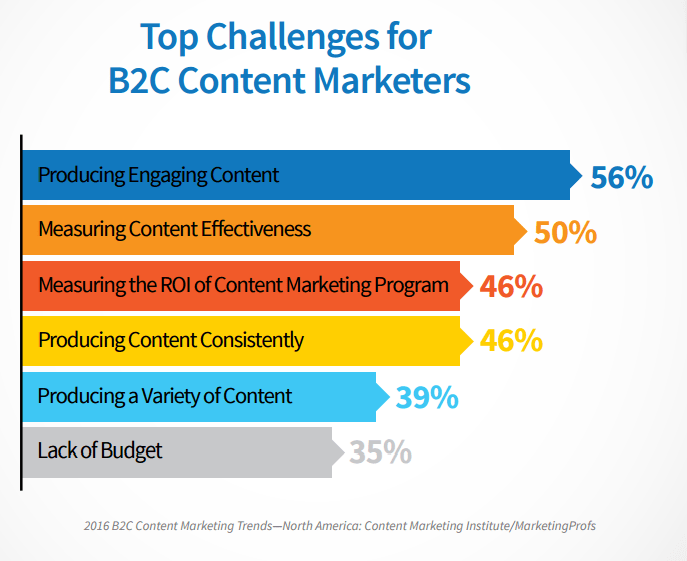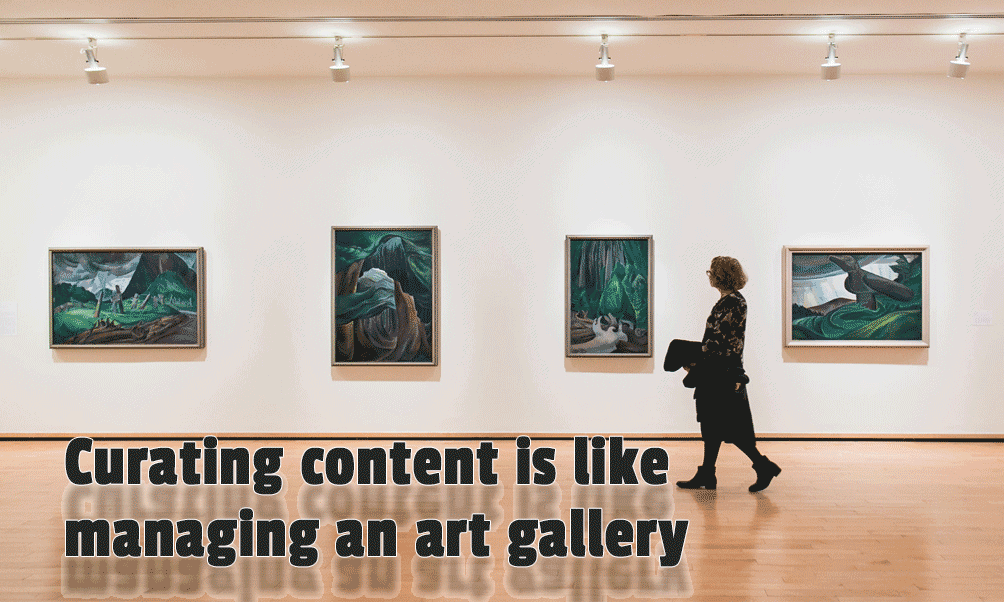
Benefits of content curation.
You curate content when you link to high quality content from other websites and blogs through your own website or blog.
If you’re sharing links from other websites and blogs, from Twitter and Facebook, in a manner, you are already curating content.
To improve engagement and for better SEO, you’re often advised to publish original content regularly.
Unless you’re a big organization and you have a dedicated team of content writers, publishing original, quality content regularly can be quite difficult.
It is not just about writing and publishing, you constantly need to come up with great topics and writing ideas and then publish quality content.
Sometimes, content curation can help you.
Just like you, many people in your industry – whether they directly compete with you or indirectly, or not at all – are publishing quality content.
This is valuable information, and your visitors can benefit from this information.
Just because information is appearing on another’s website or blog, it doesn’t mean your visitors should be deprived of such information.
At the same time, if you are publishing useful information on your own, you don’t want to link to another’s website.
I recommend content curation to my clients when they cannot come up with an interesting topic or when for the time being, we have exhausted all our options.
Content curation happens in 2 manners:
You create a list of all the blogs and websites covering the topic under which you are curating content.
For example, “The top 5 blog posts on the benefits of content curation” and then including links from other blogs with small introductions.
You can simply talk about one topic from one blog and then add your own comments.
In both the cases you are curating content because you are picking up someone else’s thoughts and your either expressing those thoughts as they are or adding your own take.
I normally prefer creating dedicated blog posts for dedicated links. I have rarely created a “list” of other links.
Below I’m listing 5 benefits of content curation.
1. Gives you an unending supply of content writing ideas
Among the top challenges faced by content marketers is producing content consistently and on top of that, making sure that the content remains engaging and valuable.

B2B content marketing challenges.
It is important to publish fresh content regularly on your website. There are multiple benefits of publishing regular content on your website or blog.
If you don’t publish content regularly, your current search engine rankings immediately begin to suffer and there is a drastic reduction in the number of people coming to your website.
Your business suffers.
The problem is, regularly coming up with fresh content writing ideas is a big challenge.
Although there are different ways to come up with great content writing ideas every day, sometimes, it is simply not possible.
In such circumstances, through content curation, you can have practically an unending supply of content writing ideas.
Maintain a list of your industry blogs. You can use a content aggregation service like Flipboard, Feedly or Google Discover to track topics.
Whenever you cannot come up with a great content writing idea, quickly go through these content aggregation services and curate something.
2. Drive thought leadership with content curation

Build thought leadership with curated content.
Thought leadership isn’t always about writing and publishing high-quality content of your own.
This blog post rightly suggests that your audience judges you based on the content you share.
Another interesting point mentioned in the above link is that if you never curate content, your website or blog becomes an echo chamber, and you don’t want that.
People want to know what you think of others’ opinions.
For example, on my blog I have multiple times written that I don’t agree that you always have to write 3000-5000-word blog posts for better search engine rankings, as is often suggested by top SEO and content marketing companies.
For better search engine rankings, focus on a topic and provide highly valuable and niche information on it. Even that improves your SEO.
Hence, this is a difference of opinion.
You need to be cautious if you want to build your thought leadership by making content curation an integral part of your overall content marketing strategy.
Always link to high quality and authoritative websites and blogs posts, preferably to thought leaders who are highly regarded.
I’m not saying you don’t link to lesser-known people – make a judgement call. Being an authority yourself, you can easily find out if the content you are curating is worth linking to or not.
3. Improves your SEO
This is something that I have personally experienced.
Suppose I’m looking for some content curation opportunities and on Google I come across a blog post that is ranking at the top.
I write a similar blog post and then link to the blog post that is ranking high, of course, with my own thoughts added to make sure that I’m publishing an original blog post.
I have observed that my blog post with the curated link either begins to appear just below the main link or somewhere on the same page.
Of course, there are lots of other factors that help you rank well, but it certainly helps you improve your search engine rankings if you create/curate content based on blog posts that are already ranking high.
4. Makes your content diverse
As I have mentioned above, you don’t want your blog to become an echo chamber of your own thoughts.
When you curate content, you treat your visitors with diverse opinions or different chains of thoughts even if you don’t agree with them. This gives you a richness.
If your regular visitors are getting bored of (they do) simply reading what you have to say about different subjects, this will give them a breath of fresh air and then they will be ready to come back to your own thoughts.
5. Helps you improve your topic density or keyword density
When you curate content you mostly curate content that is from your own field or profession.
For example, if I’m curating content I am mostly interested in topics related to content writing, copywriting, SEO content, content marketing, email marketing, writing tips, and so on.
My audience comes to read these topics. Consequently, I’m not going to curate content on real estate unless it has got something to do with my profession.
All my topics are going to deal with my profession – writing, content writing and so on.
This increases my keyword density.
Similarly, if you are a financial coach and you curate lots of content on financial coaching, you’re going to increase your keyword density for financial coaching.
Concluding remarks
Normally, when you search for “content curation” and its benefits, you mostly come across blog posts talking about sharing content on social media and social networking websites.
Yes, that too is content curation, but it’s better use is when you use content curation to generate high-quality content for your own blog.








